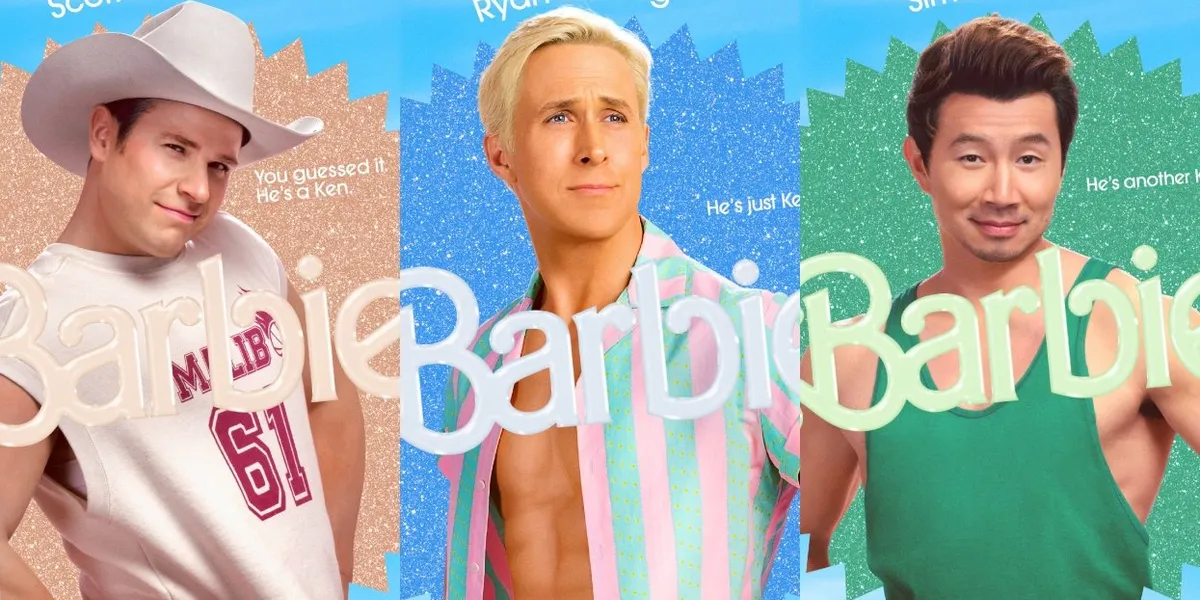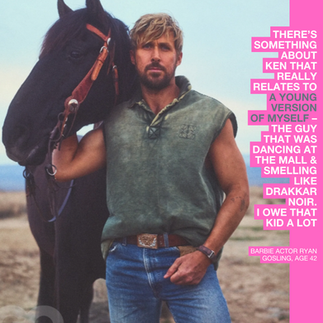Why watch Barbie: 5 sex-ed topics to discuss with kids
- Leah Jewett

- Aug 10, 2023
- 5 min read
Updated: Aug 31, 2023

“I have never known Barbie without knowing the argument against Barbie”
– director Greta Gerwig, age 39
Barbie is a game changer. It’s girl positive, female driven. A sociological phenomenon that’s ignited criticism, backlash, celebration and an appetite for debating gender expectations.
The first time we saw this bubblegum-pink fever dream of a blockbuster, it felt fun and incisive but a bit simplistic and uneven. Still, we hadn’t expected the emotional rollercoaster ride of thinking about our own relationships with dolls and toys, our daughters at a young age and how complicated it can be connecting with them. Hearing the line “Men rule the world” made us sad for our girls – and our boys. But it got us laughing, bemused by the unprecedented use of hot pink and thrilled to be in on this zeitgeist-defining moment.
The second time we saw Barbie, we appreciated every minute – we felt right at home being back in the static neon-pink escapism and revelled even more in some of the songs and dances, the subversiveness, comic timing and cultural commentary.
What really resonates is the male angle. While Margot Robbie as Stereotypical Barbie is assured, glowing and cheerily likable, Ryan Gosling is endearing as decorative-not-functional Ken. He postures, strives, falls apart. His asserting his own identity mirrors what women often go through in propping up and being defined by men. He reflects how boys have to work out which aspects of masculinity, with all its strengths and weaknesses, to call their own.
We should all see Greta Gerwig’s film – boys and men too. (Anecdotally, lots of them like it.)
But why watch Barbie?
• See it to be in on this female-affirming moment that is provoking cultural interrogation beyond the big screen. It’s “a movement, a revolution,” wrote Polly Hudson in The Mirror. “This film should be part of the national curriculum. And for parents unsure how to steer their kids against misogyny in a non-preachy way they’ll understand, Barbie is the answer.”
• See it to be inspired to “unpack the ways Barbie made us see the world and how our ideas have changed and understand more about who we were”. And to “de-programme” ourselves from years of “trying to change, control, hide and hate our bodies into submission to conform to [impossible] standards”. To talk openly with our kids, we need to reflect back on how our own experiences around sex, relationships and body image shaped us.
• See Barbie with your girl or boy, or just for yourself, so you can make use of the sex & relationships themes that jump out at you as conversation starters.
Here are 5 sex-ed related topics inspired by Barbie to capitalise on with your child…

BODY IMAGE Generations of mums didn’t want their girls to measure themselves against the impossible beauty standards embodied by the tall, thin blonde doll who wouldn’t be able to stand if she were real. It’s striking how, universally, some kids took out their aggressions – over Barbie’s unattainable physique or inflexible body; because of internalised misogyny? – on their dolls, disfiguring them into a version of chop-haired, scribbled-on, doing-the-splits Weird Barbie. Clearly Barbie is a way in to “talk and teach body image”
OBJECTIFICATION It’s refreshing to see the script flipped, with men caricaturing sex appeal and vying for the female gaze. And in an exhilarating role reversal of a woman finding purpose through her relationships to others (as a daughter, mother, partner), here the man is marginalised, an accessory, a support act, eye candy. Ken is happy to be along for the ride, a toy boy without a job (it’s just “beach”) or an identity (beyond craving Barbie’s attention). He takes on “softboy tendencies: mansplaining, faux sensitivity and hipster posturing”. What’s touching is his “unstoppable Kenergy” identity crisis, his insecurities and his voyage of self-discovery. In our male-dominated world – with man box rules for boys around power, anger, stoicism and vulnerability – don’t all boys have to wrestle with how they confront masculinity, patriarchy and questions like: “Who am I? What do I like? Why do I like this?”

REPRESENTATION Many mothers, Gerwig’s included, rebelled against their kids buying into the vacuous smile-look-sexy-and-shop aspirations Barbie can project (“Math class is tough,” said Teen Talk Barbie in 1992; “Don’t eat,” advised Slumber Party Barbie’s 1965 diet book). But for some kids Barbie unlocks the potential for imaginative play through 200-plus career choices (Astronaut Barbie appeared in 1965 though real American women couldn’t own a credit card until 1974). Just as Barbie no longer “mostly presents as” blonde now that the doll has been evolved to showcase various ethnicities, hair types, body shapes and abilities, the film also includes diverse Barbies and Kens. But despite its camp aesthetics and equal-opportunity Barbiecore attire, the LGBT+ characters are disappointingly downplayed
FEMALE FOCUS A project spearheaded by actor/producer Margot Robbie, Barbie was directed, co-written and executive-produced by Oscar-nominated Greta Gerwig, director of Lady Bird and Little Women, about which Meryl Streep coined the fantastic oxymoron: “It’s epic personal filmmaking.” Will Barbie’s box office record-breaking spur Hollywood to bank on how “women want to see themselves on screen and femininity depicted with admiration, celebration and seriousness”? Let’s talk with all of our kids about how important this moment is: a film that validates women onscreen and behind the scenes has unleashed, on a wide audience, ideas on how patriarchy affects both women and men, and got us talking…

THINK OUTSIDE THE BOX Barbie – in sending up the problematic, complicated-icon dolls along with hyper-femininity, toxic masculinity, mansplaining, sexism, the girlboss, the toy boy and more – gets us questioning our culture. What have we been conditioned to feel about pink – and do you police how much pink you and your girl or boy wear? Would you buy a boy a Barbie or Ken? What are the pros and cons about playing with these dolls? Is it meaningful to be judged by, and base your self-worth on, your looks? What has this film stirred up and tapped into – why is it moving so many people? It’s always important for us as parents to encourage critical thinking in our kids so they can decode society’s messages and values around sex & relationships issues – and Barbie galvanised the world into reacting!
• “We panic about giving our kids Barbies because we don’t want them to grow up with the same loathing of our bodies that we have, or to waste the same amount of time missing out on life because of the way they think they look. But we forget that actually WE are a stronger influence on our kids’ thoughts and feelings about themselves, their bodies and their worth”– body image expert Dr Zali Yager
• “I thought I was Team #Oppenheimer but I love how #Barbie with its themes touching on existentialism, feminism, empowerment, mind control & misuse of corporate power has pissed off the right people” – former crown prosecutor Nazir Afzal
• From No, The Barbie Movie Is Not Anti-Men (The Gamer, 24/7/23) on Barbie & Oppenheimer opening the same day “There’s one movie in theatres right now about the violence of being alive, the control we each hold over each other, the dangers of unchecked power and the cruelty of those who sit in judgement over the rest of society. The other one is Oppenheimer”
RECOMMENDED THINK (PINK) PIECES How Barbie Helped Raise a Generation of Feminists (Time, 19/7/23) • What Barbie Says About the Gender Wars (Politico, 21/7/23) • Barbie was once a dangerous role model for girls but new movie is perfect springboard to protect your kids, expert says (US Sun, 19/7/23) • Issa Rae Says She Used Her Barbies to “Fulfill Scenarios” Growing Up – Like “Sex-Ed” (People, 12/7/23) • The Barbie movie’s radical message: We all need more “Kenpathy” (Los Angeles Times, 4/8/23) • What Barbie Understands About Mother-Daughter Relationships (Atlantic, 5/8/23) • “The antidote to women-haters – the Barbie movie should be on the national curriculum” (Mirror, 26/7/23) • We need more “Kenergy” in the real-world right now (Marie Claire, 18/7/23) • My Weekend (Pink) Crush (Dorothy Surrenders, 28/7/23) • What a body image expert really thinks of the Barbie movie (Women’s Agenda, 17/7/23)
To read even more, click here…
































Sometimes you can tell within seconds whether a site feels comfortable or not. For me, Login Sultan33 felt easy to navigate right away. I usually like checking background information, so I went through Login Sultan33 and Login Sultan33 as well. The whole process felt smooth, not like jumping through steps, which I personally appreciate.
What stands out in many game platforms is how easily players can move between sections. The structure visible on Login Nixtoto feels organized, while secondary access points on Login Nixtoto support smoother interaction. Transparency remains important, and that’s where Login Nixtoto fits naturally.
Using technology to increase access to youth mental health support may offer a practical way for young people to reach guidance, safe-spaces, and early help without feeling overwhelmed by traditional systems. Digital platforms, helplines, and apps could give them a chance to seek support privately, connect with trained listeners-or explore resources that might ease their emotional load. This gentle shift toward tech-based support may encourage youth to open-up at their own pace, especially when in-person help feels too heavy to approach.
There is always a chance that these tools-quietly make support feel closer than before, creating moments where help appears just a tap away. Even a small digital interaction might bring a sense of comfort. And somewhere in that space,…
Detailed and practical, this guide explains concrete rebar in a way that feels approachable without oversimplifying. The step by step clarity is especially useful for readers new to the subject. I recently came across a construction related explanation on https://hurenberlin.com that offered a similar level of clarity, and this article fits right in with that quality. Great شيخ روحاني resource. explanation feels practical for everyday rauhane users. I checked recommended tools on https://www.eljnoub.com
s3udy
q8yat
elso9
Really thought-provoking post this is such an important conversation to have with kids. Watching Barbie is a great springboard for discussions on body image, consent, relationships, and more. I’d love to curl up with this article in The Voice S28 Max Cooper III Cow Print Jacket bold, comfy, and full of character!